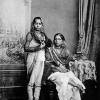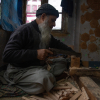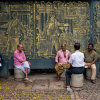It was in 1941 that I started writing The Last Page. Six years may be no more than a drop in the ocean of eternity, but how the world has changed in this short period! On 22nd June 1941, when the first Last Page appeared, Hitler’s legions were goose-stepping across the Soviet border, the Congress leaders were in jail, and the Muslim League demand for Pakistan was regarded as a bluff and a maneuver for political bargaining. On 22nd August 1947, as I write these lines, the first contingent of British troops to ‘Quit India’ is embarking for England, the former seditionists and jailbirds constitute the first Government of free India, and Pakistan is a week-old reality. Between these two dates lies one of the most eventful epochs of human history—the epoch of the fall of Fascism and Nazism, of the discovery and first use of the Atomic Bomb, of the beginnings, however feeble, of a World Government, of the culmination of India’s long and unique struggle for national freedom in the partition of the country and the transfer of power from Britain to the two Dominions of India and Pakistan.
It is this epoch, a significant and compact segment of time that is chronicled in the preceding pages. From 22nd June 1941, to 15th August 1947, from the invasion of Russia to the emancipation of India—the world has gone through one of the most amazing phases of human evolution. The declaration of Indian independence on August 15 seems historically an apposite and, indeed, striking finale to conclude this chronicle.
But the end of one era is also—and always—the beginning of another. The struggle for freedom has ended. But freedom has just begun. The preservation of the newly-won freedom against attacks from within and from without, the enlargement of its scope in terms of social justice and economic betterment of the masses, the need for a cultural renaissance—all these impose fresh responsibilities on all of us. The tasks of reconstruction are as important and as difficult as the struggle to wrest power from unwilling imperialist hands. The recent outbursts of communal fanaticism and frenzy have laid waste big areas in the country. Tens of thousands have died. Millions have been uprooted, rendered homeless. Unspeakable horrors have been perpetrated on both sides. Exchange of populations, the miserable plight of refugees on either side, the perilous insecurity of the minorities, the severe blow to national economy, the food scarcity and the impending famine—these problems are big enough to engage the Government of India and Pakistan for the next 10, if not 20 years. But far more important is the problem raised by the dehumanization of vast masses of our fellow countrymen. Hindus and Muslims and Sikhs, who today are demented with hate and violence and murder-lust. They have to be pacified and reclaimed for humanity, and the values of sanity, tolerance and good-neighbourliness have to be restored to them.
In such an atmosphere, old problems, old values, old formulae, and old slogans are hopelessly out of date. ‘Freedom’, in the very hour of its achievement, is tinged with irony and disillusion; ‘Unity’ has become a hollow mockery. ‘Imperialism’ has changed its tactics and can hardly be recognized as Mountbatten publicly salutes the tricolor of revolt. ‘Non-violence’ has gone up in flames in the holocaust of East and West Punjab. Within less than a week, the hectic jubilation of August 15 seems in retrospect to have been a mirage and an illusion.
Many of our illusions, indeed, are dead and buried forever. Gone is our complacent faith in the essentially non-violent and peaceful nature of our illiterate, superstition-ridden peasantry; gone the belief that Hindu and Muslim lived in idyllic peace and tranquility in the countryside, away from the turmoil of city politics; gone is the fond hope that Imperialism had really changed its spots and would relinquish power peacefully without a fight—without making us fight! But the death of these illusion can be all to the good. It can restore cold reason to the atmosphere of emotional politics; it can help us to have a clearer vision in the future. If only these illusions had not died so suddenly and so violently! If only we could have been disillusioned without the cost of so many human lives!
Thus we step across the bloody threshold of history. And we shall be better able to find our way in the future if we have a clearer perspective of the past. This book will have served its purpose if it affords to some extent the correct appraisal of the critical years we have just gone through. For the past lives on in the present and the present in the future. There is neither end nor beginning.
(Published on August 22, 1947)











